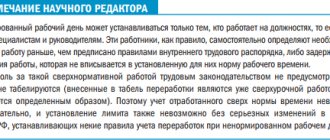Transferring employees to part-time work is a measure necessary to save money for the enterprise. As a rule, it is relevant in times of financial crisis. If there is a lack of economic resources, the employer has two options for solving the problem: either reducing staff, or shortening the working week and commensurately reducing spending on salaries. The latter measure is preferable.
According to Convention No. 175 and State Labor Committee Regulation No. 111/8-51, a week is considered incomplete if its duration is less than 40 hours. Transfer to a part-time week at the initiative of the employee and at the initiative of the employer are procedures that differ significantly from each other.
Who has the right to work part-time?
Part-time working hours are established (Article 93, Article 256 of the Labor Code of the Russian Federation):
| By agreement of the parties | Mandatory |
| For any employee | When contacting:
|
| For any period, including without restrictions | No more than the period of validity of the listed circumstances |
Standard hours for a shift work schedule according to the Labor Code
Working time recording is the measurement of compliance with an employee’s obligation to fulfill standard working hours. There are modes:
- with daily wages;
- weekly;
- summarized accounting of working hours.
Sum count
According to Part 1 of Art. 104 of the Labor Code of the Russian Federation, in this special regime, the duration of working hours during the accounting period should not exceed the normal number of working hours, and the accounting period itself cannot exceed 1 year.
Summarized recording of working time is relevant if the employer does not have the opportunity to introduce daily or weekly recording of working time due to the specific nature of work. However, in the accounting period, each week should account for no more than 40 hours of working time.
It is possible to comply with the requirements of the current legislation if you correctly organize the continuous labor process and correctly calculate the standard working time, relying, among other things, on the Order of the Ministry of Health and Social Development of the Russian Federation dated August 13, 2009 No. 588n “On approval of the Procedure for calculating the standard working time for certain calendar periods of time (month, quarter, year) depending on the established duration of working hours per week.” A useful tool when calculating standard hours for a shift work schedule is a working time calculator, with basic values and values already entered into the calculation program.
The introduction of summarized accounting is inevitable if employees must be at the workplace for all 24 hours. For specific work schedules:
- 2 – 2 – 3;
- 2 through 2;
- three days later;
- day - night - sleep - day off and others,
the normal number of working hours for the accounting period is determined based on the weekly working hours established for this category of employees.
- part-time (shift);
- mainly in the second shift;
- part-time work week;
- non-working holidays;
- weekend,
the normal number of working hours for the accounting period is reduced accordingly; however, payment for night hours during a shift work schedule, payment for overtime hours, the duration of shifts at night and non-working holidays during a shift work schedule are especially taken into account.
Read more: How to break through a person’s credit history for free
The current legislation, namely Article 96 of the Labor Code of the Russian Federation, defines night work as from 22.00 to 6.00. Each hour of work that occurs at night must be paid at an increased rate compared to work under normal conditions, according to Art. 154 Labor Code of the Russian Federation. The minimum increase in pay for night work is 20% of the hourly rate for each hour.
Following the requirements of Article 153 of the Labor Code of the Russian Federation, work time on a non-working holiday must be paid in accordance with the rules outlined by labor legislation. However, the employee will be paid in the standard single amount if he chooses to receive another day of rest for working on a non-working holiday.
When drawing up a shift work schedule, weekends fall on different days of the week, and do not always fall on Saturday or Sunday. Therefore, if a work shift falls on a weekend, then this day is considered a working day and the salary is calculated in a single amount.
When recording working hours in aggregate, overtime work includes:
- planned overtime - if overtime hours are already indicated in the shift schedule, which could not be drawn up within normal limits;
- unplanned overtime – carried out by an employee on the initiative of the employer, for example, when a shift worker fails to show up at the workplace.
Leave during a shift work schedule is provided taking into account the same requirements of labor legislation that apply to the usual work schedule, i.e. according to Art. 114 Labor Code of the Russian Federation.
Daily count
If the employer uses daily calculation, then the certain established norm of work per day does not change and is always the same, regardless of the day of the week. Hours worked in excess of the fixed norm are considered overtime work and are subject to monetary compensation. Following the requirements of Article 100 of the Labor Code of the Russian Federation, when organizing the labor process, daily time calculation is established for workers who work on a 5- or 6-day working week, with two or one day off, respectively. The length of the working day is equal and fixed. This is enshrined in the internal labor regulations. The reporting period subject to accounting is considered to be 1 business day.
Work time can be recorded weekly. In this case, the daily work time is established and regulated by the shift schedule. Weekly calculation applies to flexible work. With this schedule, the number of working hours per day is not constant. Calculation of labor standards with this approach is done daily, but recording and analysis is carried out weekly. At the same time, the labor standard is observed for a week, and not for one shift. At the end of the week, overtime work is also calculated.
For managers seeking to increase business productivity and profitability, working with a shift schedule is the optimal solution. The rationality of shift work is determined by management; at the same time, implementation in the production process is carried out in strict compliance with the requirements of current legislation and ensuring guarantees for the organization’s employees.
The introduction of summarized working time recording is often accompanied by numerous questions. These issues are related to the choice of schedule for the summary recording of working hours, payment of overtime, holidays and other subtleties. Let's figure it out in order.
Part-time work at the initiative of the employee
The introduction of such a daily routine requires compliance with three stages:
Let's take a closer look at each of them.
Employee's message
The law does not require contacting management in writing. But the statement confirms the employee’s interest in changing the work schedule and eliminates the possibility of coercion by the employer.
The statement states:
- name, position of the employee;
- desired operating mode;
- the reason for adjusting the daily routine (if any);
- duration of part-time work and its start date.
If the application is submitted by an employee who cannot be refused, then supporting documents are attached.
For example, when one of the parents of a child under 14 years of age applies, a certificate about the working hours of the second parent is provided, since only one of them can use the right to part-time work (Letter of the Ministry of Labor dated November 17, 2017 No. 14-2/B-1012).
Sample application form for part-time employee
Drawing up an additional agreement to the employment contract
When hiring, the conditions for part-time work are immediately written down in the contract. If the labor regime changes later, then the conclusion of an additional agreement is mandatory - after all, the terms of the contract change.
The agreement specifies (Article 57, Article 72 of the Labor Code of the Russian Federation):
- Working hours: duration of the working day and week, weekends and working days, starting and ending hours of work, breaks. In the new conditions, an irregular regime is impossible (Article 100, Article 101 of the Labor Code of the Russian Federation).
- Remuneration: in proportion to the time of work or the volume of duties performed (Article 93 of the Labor Code of the Russian Federation). It is important to write down the payment provisions in detail so that the employee does not have questions about why, with a full staff position, he received one amount, and with 0.5 of the salary, only half.
- Duration of part-time work: temporary or indefinite. When applying to an employee who cannot be refused, the period should not exceed the period of preferential circumstances (Article 93 of the Labor Code of the Russian Federation).
- Effective date of the changes.
The additional agreement is drawn up in two copies. When receiving the agreement, the employee signs the employer’s original (Article 67 of the Labor Code of the Russian Federation).
Sample additional agreement to an employment contract on part-time work
Issuance of an order
An order establishing an individual daily routine is necessary for the purpose of informing other employees, as well as accounting departments when calculating wages. In the event of labor disputes, the document will serve as evidence in court.
Sample order for establishing part-time work for an employee
Categories
In accordance with the provisions of Art. 93 of the Labor Code of the Russian Federation, part-time working hours can be established by agreement between the employee and the employer upon hiring or during the validity of the employment contract.
Part-time working hours must be provided at the request of a pregnant woman, one of the parents (guardian, trustee) with a child under the age of 14 (a disabled child under the age of 18), as well as a person caring for a sick member families in accordance with medical indications.
In addition, the introduction of a part-time working regime in accordance with Art. 74 of the Labor Code of the Russian Federation may occur en masse for a period of up to six months in relation to certain categories of workers for reasons related to changes in organizational or technological working conditions, which may lead to mass dismissal of workers. In this case, the decision to introduce a part-time working regime is made by the employer, taking into account the opinion of the elected body of the primary trade union organization in order to preserve jobs. The abolition of the part-time regime in this case is also carried out taking into account the opinion of the representative body of the organization’s employees.
If, upon introduction in accordance with the provisions of Art. 74 of the Labor Code of the Russian Federation for part-time working hours, an employee (employees) refuses to continue working under the conditions of a part-time working time regime, the employment contract with him (with them) is terminated in accordance with clause 2 of part 1 of Art. 81 of the Labor Code of the Russian Federation “in connection with a reduction in the number or staff of the organization’s employees” with the provision of guarantees and compensation to the employee (including payment of severance pay, average earnings for months of employment in accordance with Article 178 of the Labor Code of the Russian Federation).
Payment for part-time work is made in proportion to the time worked or depending on output. At the same time, the provision on payment of wages in an amount not lower than the minimum wage (from May 1, 2006 - 1,100 rubles per month) does not apply to part-time workers, since this requires working out the entire monthly working time norm .
Part-time work can be used on a part-time (shift) or part-time basis.
When
working part-time (shift),
the employee works fewer hours than established by the routine or schedule in a given organization for a given category of workers (see example 1).
With
a part-time work week,
the number of working days decreases compared to a five-day or six-day work week and, therefore, the hours of work per week (see example 2).
In addition, part-time work may consist of simultaneously reducing the working day (shift) and working week (see example 3).
Example 1
Let’s assume that from the 1st day of the month of the current year, an employee turned to the organization’s administration with a request to establish a part-time working day, working 4 hours daily against the established 8 hours a day and 40 hours a week.
Before this month, the employee was provided with the following per month:
– official salary – 2,400 rubles;
– additional payment for length of service - 20% of the official salary;
– bonus – 50% of salary.
With the introduction of a part-time regime, the employee will be required to work 4 hours a day or 20 hours a week (4 hours x 5 days a week). In total, during the current month the employee worked 87 hours (with the standard working time being 175 hours).
The monthly salary amount will be:
– official salary—RUB 1,193. 14 kopecks (RUB 2,400 / 175 hours according to standard working hours x 87 hours actually worked);
- additional payment for length of service (20% of the official salary) - 238 rubles. 63 kopecks (RUB 1,193 14 kopecks x 20%);
– bonus (50% of accrued wages) – 715 rubles. 89 kopecks ((RUB 1,193 14 kopecks + RUB 238 63 kopecks) x 50%).
The total salary for the month is 2,147 rubles. 66 kopecks
Example 2
Let's assume that an employee of an enterprise has applied for the establishment of a part-time working week starting from the current month, working 2-3 days a week according to a schedule agreed with the administration of the organization.
In total, the employee worked 9 working days, or 72 working hours, in a month.
Before the introduction of part-time work, an employee’s monthly salary was:
– tariff rate—RUB 3,200;
– surcharge for special work hours – 40% of the tariff rate.
The amount of accrued wages for the current month will be:
– tariff rate—RUB 1,316. 57 kopecks (3,200 rubles / 175 hours x 72 hours, where 175 hours is the standard working time for normal (if the employee enjoys the right to reduced working hours, then the standard should be adopted based on the reduced time) working hours for the reporting month);
– allowance for special work hours – 526 rubles. 63 kopecks (RUB 1,316.57 x 40%).
Total - 1,843 rubles. 20 kopecks (1,316 rubles 57 kopecks + 526 rubles 63 kopecks).
Example 3
Let's assume that an employee of an enterprise turned to the employer with a request to establish a part-time working schedule, in which he would work 4 days a week for 5 working hours. The employer agreed to the terms of the employment relationship.
In total, during the reporting month of the current year, the employee worked 16 working days, or 80 working hours.
The employee's monthly tariff rate is 4,000 rubles, the bonus is 40% of the tariff rate.
The monthly salary amount will be:
– official salary—RUB 1,828. 57 kopecks (4,000 rubles / 175 hours x 80 hours, where 175 hours is the standard working time for the month of March);
– bonus — 731 rub. 43 kopecks (RUB 1,828.57 x 40%).
Total salary per month is 2,560 rubles.
When making wage calculations, it should be taken into account that working hours worked in excess of the established part-time working hours per day (shift), week or month, but within the legal duration of the working day (shift) in accordance with the resolution of the Plenum of the Supreme Court of the USSR dated November 24, 1978 No. 10 “On the application by courts of legislation regulating the remuneration of workers and employees” (as amended) is not considered overtime.
Persons working part-time are paid, under general conditions, bonuses for working in multiple shifts in the amount of 20 percent for each hour of work on the evening shift and in the amount of 40 percent for each hour of work on the night shift (clause 9 of the resolution of the CPSU Central Committee, Council of Ministers of the USSR and the All-Union Central Council of Trade Unions dated February 12, 1987 No. 194 “On the transition of associations, enterprises and organizations of industry and other sectors of the national economy to a multi-shift operating mode in order to increase production efficiency”; paragraph 2 of the explanations of the State Committee for Labor of the USSR and the Secretariat of the All-Union Central Council of Trade Unions dated May 7, 1987 No. 14/14-38).
If work at night (from 10 pm to 6 am) is not performed under shift work conditions, for each hour of work, including part-time work, an additional payment must be made in the amount established by laws and other regulatory legal acts (Article 154 of the Labor Code of the Russian Federation). In such cases, the additional amount of remuneration is usually 35 or 40 percent of the official salary (tariff rate).
When part-time work is established, several employees can be hired for one position, including in budgetary institutions and other organizations operating on the basis of duly approved staffing levels (staffing schedules).
When establishing a part-time working regime for women, organizations have the right to use the provisions of the resolutions of the State Committee for Labor of the USSR, the Secretariat of the All-Union Central Council of Trade Unions dated April 29, 1980 No. III/8-51 “On approval of the Regulations on the procedure and conditions for the use of labor for women with children and working part-time time”, as well as dated June 6, 1984 No. 170/10-101 “On approval of the Regulations on the procedure and conditions for the application of a sliding (flexible) work schedule for women with children.” Moreover, both regulations in accordance with Art. 423 of the Labor Code of the Russian Federation are subject to application in the part that does not contradict the Labor Code of the Russian Federation.
Part-time work can be provided to a woman, including when she is on maternity leave until the child reaches the age of 1.5 or 3 years (see, for example, paragraph 12 of the resolution of the Plenum of the Supreme Court RF dated December 25, 1990 No. 6 “On some issues that arise when courts apply legislation regulating women’s labor”).
At the request of students, work on a part-time basis can be established on the basis of clause 12 of the Regulations on the procedure and conditions for voluntary work of students of secondary and vocational schools in their free time, approved by the resolution of the State Committee for Labor of the USSR, State Education of the USSR, the Secretariat of the All-Union Central Council of Trade Unions and the Secretariat of the Central Committee of the Komsomol dated 3 June 1988 No. 343/90-01-490/25-01/17-30/43/34-a.
When establishing a part-time work schedule, the length of the working day (shift), as a rule, should not be less than 4 hours, and the working week should not be less than 20–24 hours. However, depending on the specific production conditions, other conditions for the duration of working hours may be determined.
Part-time work schedules may include work with or without breaks for rest and meals.
If a part-time working schedule is established by agreement between the employee and the employer (organization administration), then to justify the reasons for such conditions, the employee may provide medical recommendations for disabled people, conclusions of medical advisory commissions on the transfer of an employee who has suffered an illness to work with a part-time working schedule and so on.
If the initiative to establish a part-time work schedule for certain categories of workers or individuals comes from the administration of the organization, then it must be taken into account that, in accordance with Art. 74 of the Labor Code of the Russian Federation, employees must be warned in writing about such measures two months before the introduction of part-time work.
If the employee does not agree to continue working under the new conditions, the employer is obliged to offer him in writing another job available in the organization that corresponds to his qualifications and state of health, and in the absence of such work, a vacant lower position or lower paid job that the employee can perform, taking into account his qualifications and state of health. In this case, the employer is obliged to offer the employee all vacancies available in the given area that meet the specified requirements. The employer is obliged to offer vacancies in other localities if this is provided for by the collective agreement, agreements, or employment contract. If there is no corresponding work or the employee refuses the offered work, the employment contract concluded with him is terminated under clause 7, part 1, art. 77 of the Labor Code of the Russian Federation “in connection with the employee’s refusal to continue working due to a change in the terms of the employment contract determined by the parties.”
Conditions for part-time work may be fixed by the terms of a written employment contract concluded between the employee and the employer.
It is necessary to take into account that those employed on a part-time basis enjoy all the benefits, guarantees and compensation established by current legislation.
In accordance with the generally established procedure, these persons are provided with annual paid leave (Articles 114 and 116 of the Labor Code of the Russian Federation), as well as additional days off to care for disabled children and people with disabilities from childhood until they reach the age of 18 years, provided for in Art. 262 of the Labor Code of the Russian Federation, which is enshrined in clause 10 of the clarifications of the Ministry of Labor of Russia and the Social Insurance Fund of the Russian Federation dated April 4, 2000 No. 3/02-18/05-2256 “On the procedure for providing and paying additional days off per month to one of the working parents (guardian, trustee) to care for disabled children.” These clarifications were approved by Resolution of the Ministry of Labor of Russia and the Federal Social Insurance Fund of the Russian Federation dated April 4, 2000 No. 26/34).
At the same time, it is necessary to take into account that employees with irregular working hours, when establishing a part-time working day, may lose the right to additional leave for irregular working hours, provided for in Art. 119 Labor Code of the Russian Federation. If a part-time working week is established, the right to additional leave may be retained.
For employees working part-time in industries, workshops, professions and positions with hazardous working conditions, only those days on which they were actually employed in hazardous working conditions for at least half are counted towards the length of service that entitles them to additional leave on these grounds. working day established for workers of a given production, workshop, profession or position (Instructions on the procedure for applying the List of productions, workshops, professions and positions with hazardous working conditions, work in which gives the right to additional leave and a shortened working day, approved by a resolution of the USSR State Committee for Labor and Presidium of the All-Union Central Council of Trade Unions dated November 21, 1975 No. 273/P-20).
The use of part-time work by organizations has its own characteristics when calculating average earnings and taking into account the number of employees when filling out state statistical reporting forms.
Calculation of average earnings for employees who are subject to part-time work is carried out in accordance with Art. 139 of the Labor Code of the Russian Federation and the Regulations on the specifics of the procedure for calculating average wages, approved by Decree of the Government of the Russian Federation of April 11, 2003 No. 213.
From October 6, 2006, calculation of average earnings for the period of vacation granted and (or) payment of monetary compensation for unused vacation is made based on the employee’s average daily earnings for the 12 calendar months preceding the month in which the vacation begins. At the same time, the collective agreement or other local regulatory act in force in the organization may provide for other periods for calculating average wages, unless this worsens the situation of employees.
The average daily earnings for vacation pay and compensation for unused vacations are calculated by dividing the amount of accrued wages in the billing period by 12 (the number of calendar months of the billing period) and by 29.4 (the average monthly number of calendar days). If any of the months of the billing period has not been fully worked out, the calculation of average earnings must be carried out taking into account the provisions of clause 9 of the Regulations on the specifics of the procedure for calculating average wages using a conversion factor of working days into calendar days equal to 1.4 (see example 4) .
For all other cases of calculating average earnings established by the Labor Code of the Russian Federation, when an employee is assigned part-time work (part-time work week, part-time work), the average daily earnings in accordance with clause 8 of the Regulations on the specifics of the procedure for calculating average wages are calculated by dividing the amount actually accrued wages for the number of working days according to the calendar of a five-day (six-day) working week falling on the time worked in the billing period (see example 5).
Example 4
Since February 1 of this year, the administration of the enterprise, in accordance with the established procedure, due to the difficult financial situation, introduced a part-time working week - 4 days a week.
From October 16 of the current year, the employee goes on vacation for 28 calendar days.
In the billing period from October 1 of last year to September 30 of this year, which was fully worked out, the employee was credited with 156,000 rubles.
The average salary per vacation will be 12,380 rubles. 95 kopecks (RUB 156,000 / 12 months of billing period / 29.4 x 28 calendar days).
Example 5
Let's use the conditions of example 5 and assume that from October 16 to October 20 of the current year the employee was on a business trip. The specified period according to the employee’s work schedule accounts for 4 working days.
In the billing period, the employee actually worked 182 working days, and the amount of wages taken into account amounted to 165,200 rubles.
The amount of average earnings for the days of a business trip will be 3,630 rubles. 77 kop. (RUB 165,200 / 182 days x 4 working days).
The procedure for recording employees performing their labor duties on a part-time basis when determining average headcount indicators is regulated in accordance with Rostat Resolution No. 50 of November 3, 2004 “On approval of the Procedure for filling out and submitting unified forms of federal state statistical observation: No. P-1 “ Information on the production and shipment of goods and, No. P-3 “Information on the financial condition of the organization”, No. P-4 “Information on the number, wages and movement of workers”, No. P-5 (m) “Basic information on the activities of the organization” .
According to clause 87.3 of the Procedure approved by the said resolution of Rosstat, persons who worked part-time in accordance with an employment contract or were transferred with the written consent of the employee to work part-time, when determining the average number of employees, are taken into account in proportion to the time worked.
The part-time working regime can also be applied under the conditions established by the Regulations on the procedure and conditions for the employment of women with children and working part-time, approved by Resolution of the State Committee for Labor of the USSR and the Secretariat of the All-Union Central Council of Trade Unions dated April 29, 1980 No. 111/8-51. Under the conditions of the new Labor Code of the Russian Federation, the application of this Regulation is possible due to the provisions of Art. 423 of the Labor Code of the Russian Federation, but only in part that does not contradict the new Code.
Part-time working time (part-time or part-time working week) can be established by agreement between the administration and a woman (another parent, guardian, trustee) with children when hiring her, as well as between the administration and a working employee, if due to With the need to care for children, he cannot work full time.
In addition, women who are on maternity leave until the child reaches the age of one and a half years can work part-time.
Part-time working hours can be established by agreement of the parties without a time limit or for any period convenient for the employee - until the child reaches a certain age, for the period of the school year, etc.
An order to hire an employee or an order to establish a part-time working regime for a working employee indicates the period of work under the conditions of this regime, the duration of working hours, the work schedule during the working day or week, the need for vocational training or retraining and other conditions.
It must be taken into account that an employee’s request when hiring him to establish a part-time working schedule should not be a reason for refusing to conclude an employment contract with him.
The establishment of a part-time working regime certainly entails payment in proportion to the time worked or depending on output.
Working hours established for part-time work may include:
· reducing the duration of daily work (shift) by a certain number of working hours on all days of the working week;
· reducing the number of working days per week while maintaining the normal duration of daily work (shift);
· reducing the duration of daily work (shift) by a certain number of working hours while simultaneously reducing the number of working days per week.
These work regimes may involve dividing the duration of daily work into parts (for example, delivering morning and evening mail, selling newspapers and magazines, etc.).
As a rule, the length of a working day (shift) is at least 4 hours, and the working week is at least 20–24 hours. Depending on the specific production conditions, other working hours may be established.
A break for rest and food during part-time work is established, as a rule, in the case when the duration of work (shift) is more than 4 hours a day. The start and end times of the break are set by the administration of the organization by agreement and taking into account the wishes of the employee. Please note that break time is not included in working hours and is not subject to payment.
Mothers who are breastfeeding and women with children under the age of one and a half years, including those working part-time, in addition to a break for rest and food in accordance with Art. 258 of the Labor Code of the Russian Federation, additional breaks must be provided for feeding the child (children) at least every three hours of continuous work, lasting at least 30 minutes each. If there are two or more children under the age of one year, the duration of the break is set at least an hour.
At the request of the woman, breaks for feeding the child (children) can be added to the break for rest and nutrition, or in aggregate form they can be transferred both to the beginning and to the end of the working day (work shift) with a corresponding reduction. Based on this, the employee’s daily work period may be reduced during these breaks.
Unlike breaks for rest and food, breaks for feeding a child (children) are included in working hours and are subject to payment in the amount of average earnings. In this case, the average earnings are calculated in the manner established by Art. 139 of the Labor Code of the Russian Federation and the Regulations on the specifics of the procedure for calculating average wages, which was approved by Decree of the Government of the Russian Federation of April 11, 2003 No. 213.
Alternatively, the work of women and other employees with children can be organized under the terms of the Regulations on the procedure and conditions for applying a sliding (flexible) work schedule for women with children, approved by Resolution of the State Committee for Labor of the USSR and the Secretariat of the All-Union Central Council of Trade Unions dated June 6, 1984 No. 170 /10-101. Consideration of the provisions of this regulatory act is the subject of subsequent publications of the journal.
Of the said Regulations, particularly noteworthy is paragraph 11, according to which the involvement of women with children and working part-time to work beyond the working hours established by the employment contract can be carried out on conditions of increased pay in accordance with the norms of labor legislation.
For example, if an employee is assigned a part-time working day of 4 hours, and she is involved in performing her job duties beyond the specified duration, then the working time worked in excess of 4 hours should be recognized as overtime with increased pay in accordance with Art. 152 Labor Code of the Russian Federation.
For the first two hours, overtime work is paid at least one and a half times the rate, for subsequent hours - at least twice the rate. Specific amounts of payment for overtime work may be determined by a collective agreement or directly by an employment contract. At the request of the employee, overtime work, instead of increased pay, can be compensated by providing additional rest time, but not less than the time worked overtime.
Accordingly, if an employee, in agreement with the administration, is involved in performing work duties on a day that, according to the part-time work schedule (in particular, a part-time work week), falls on a non-working day for him, it is necessary to talk about payment for work on such a day as for working on a day off.
According to Art. 153 of the Labor Code of the Russian Federation, work on a day off is paid at least double the amount. The specific amount of increased pay is fixed in a collective agreement, other local regulatory act, or directly in the employment contract concluded with the employee.
At the request of an employee who worked on a day off, he may be given another day of rest.
It should be taken into account that pregnant women are not allowed to work overtime at all, and women with children under three years of age are allowed to work overtime with their written consent and provided that such work is not prohibited for them for health reasons in accordance with with a medical report, and the employees themselves are informed in writing of their right to refuse overtime work.
Involving women with children under three years of age to work on weekends and non-working holidays in accordance with Art. 113 of the Labor Code of the Russian Federation is also allowed only if such work is not prohibited for medical reasons. The employees themselves must be informed in writing of the right to refuse such work.
To attract overtime work, as well as to perform work duties on days off for an employee, days off can be carried out only on the basis of the written consent of the employee.
Part-time work at the initiative of the employer
Management, due to changes in working conditions (organizational or technological), has the right to offer employees part-time work. To do this, the employer sends them notifications in any form with the following information:
- deadline for making a decision by the employee;
- a list of vacancies for which the conditions do not change;
- a message that if refused, the employment contract will be terminated (Article 74 of the Labor Code of the Russian Federation).
Additionally, a column is indicated in which the employee will indicate whether he agrees or not.
If the employee agrees
If the employee is satisfied with the proposed working conditions, an additional agreement to the employment contract is concluded and an order is issued.
If the employee does not agree
The management has the right to change the operating hours taking into account Art. 74 Labor Code of the Russian Federation. For this:
- an order is issued to change working conditions;
- the employment service is informed (see sample on the K+ website);
- Employees are notified at least 2 months in advance;
- vacancies for transfer are offered, if any (for information on how to formalize an agreement when transferring to another position, see this article).
If an employee refuses to switch to part-time work, dismissal follows clause 7 of Art. 77 Labor Code of the Russian Federation. If the employee changes his mind and agrees, an additional agreement and order follow.
Threat of mass layoffs
To prevent mass layoffs Art. 74 of the Labor Code of the Russian Federation allows for the introduction of part-time work temporarily - up to 6 months.
In addition to the measures taken if the employee does not agree to the new routine, the opinion of the trade union is taken into account. A draft order to change working conditions, indicating the reasons, is sent to the authority, taking into account Art. 74, 372 Labor Code of the Russian Federation:
Judicial practice (for example, the Appeal ruling of the Krasnoyarsk Regional Court dated November 10, 2014 in case No. 33-10461) notes that the mass dismissal of workers by virtue of Art. 74 of the Labor Code of the Russian Federation is carried out according to clause 2 of Art. 81 of the Labor Code of the Russian Federation (abbreviated). And when individual employees who do not agree to work part-time are fired, clause 7 of Art. 77 Labor Code of the Russian Federation.
Procedure for establishing partial time
- The employer notifies employees in writing about the establishment of part-time work in the organization. The notice is given to the employee against signature. An act of refusal to receive it is drawn up.
- Next, an order is issued on the upcoming introduction of the NRT regime, which indicates the grounds and necessity for such an establishment.
- Workers familiarize themselves with the order against signature.
- Employees who refuse are offered other positions in writing. Such notice must contain:
- Job title;
working conditions;
- description of the job function;
- amount of payment and other essential conditions.
- If the employee agrees to move to another position, a corresponding additional agreement is concluded.
- If the employee does not agree, he is dismissed after 2 months.
In this case, it is advisable to offer several positions to choose from in the notification. Notify the employee in accordance with Art. 74 of the Labor Code of the Russian Federation, possibly within 2 months either several times or once.
Changes in internal labor regulations
If a part-time working regime is introduced throughout the organization or in relation to a structural unit or a number of positions, then the rules will require adjustments (Article 100, Article 189 of the Labor Code of the Russian Federation):
Read about how to draw up house rules here.
Shift work
In a situation with summarized accounting of working hours, concepts such as “shift work” and “working week with days off on a staggered schedule” are often confused. It is worth keeping in mind that these are two different working hours.
Art. 103 of the Labor Code of the Russian Federation defines shift work as work in two, three or four shifts, which “is introduced in cases where the duration of the production process exceeds the permissible duration of daily work, as well as for the purpose of more efficient use of equipment, increasing the volume of products or services provided” .
The most important condition for shift work is the rotation of workers (one shift/team replaces another). In case of shift work, the employer is obliged to familiarize the employee with the shift schedule no later than one month before it comes into force. Working two shifts in a row is prohibited.
Read more: How to return collective insurance on a VTB loan
Employment service notification
When establishing a part-time working schedule by agreement of the parties, there is no need to inform the employment service (Rostrud Letter No. 1329-6-1 dated May 17, 2011).
The employer's initiative entails mandatory notification of employment authorities within 3 working days from the date of the decision. When using Art. 74 of the Labor Code of the Russian Federation, we recommend following this rule regardless of whether there is a threat of mass layoffs or not (clause 2 of article 25 of the Law of April 19, 1991 No. 1032-1 “On employment in the Russian Federation”).
A universal form of notification has not been established, but it can be developed at the regional level (Article 7.1-1 of Law No. 1032-1). Therefore, the employer clarifies with the employment service authorities whether the form is approved at the level of the constituent entity of the Russian Federation. If not, the notice should indicate:
- reasons for introducing a new routine related to changes in technological or organizational working conditions;
- the average number of employees at the time the decision was made;
- the number of employees in respect of whom the work regime is being changed;
- duration of part-time work;
- deadline for introducing the regime.
Union participation
The union's opinion on this matter is necessary if company management introduces shortened schedules in order to prevent mass layoffs of personnel. Then the director, before reducing the number of days or hours, is obliged to send a draft regulatory document to the trade union.
Trade union employees must study the submitted papers and, within 5 days of receiving them, provide the sender with their informed opinion. If the trade union body does not agree with any points of the local act, it can propose changes to management. The employer makes a decision to change the document within 3 days.
If it is not possible to reach an agreement, the contradictions are formalized using a protocol. After this, the company's management can adopt a regulatory act and introduce changes to the operating mode on its own terms. But in this case, you should be prepared for the fact that the trade union will want to challenge the employer’s decision in court or the labor inspectorate. If the dispute is decided not in favor of the initiator, he will have to cancel the innovation.
What are the consequences of violating the procedure for introducing part-time work?
Art. 5.27 of the Code of Administrative Offenses establishes measures of employer liability:
| Composition of the offense | Punishment | Clause Art. 5.27 Code of Administrative Offenses |
| Violation of labor laws (for example, violation of the employee’s notice period or refusal to establish part-time work for a person whose wishes should be satisfied) |
| 1 |
| Repeated violation of labor laws |
| 2 |
| Inadequate execution of an employment contract (including additional agreements regarding a detailed indication of the new work schedule, which differs from the general one in the organization) | Administrative penalty:
| 4 |
| Repeated improper execution of an employment contract |
| 5 |
You can find answers to your questions, as well as sample documents in ConsultantPlus.
Full and free access to the system for 2 days.
The legislative framework
Article 103 of the Labor Code of the Russian Federation provides the concept of shift work and the grounds for introducing a shift work schedule. The legislator attributes the following objective circumstances to the reasons for introducing shift work:
- The duration of the production process associated with technological features, in which it is inevitable that the permissible duration of daily work will be exceeded. Or with the urgent need of society for the provision of certain services around the clock. For example: organizations providing security services (private security companies/private security companies); 24-hour emergency medical assistance.
- The need for highly efficient operation of technical equipment, a larger number of products, and certain services. For example, 24-hour operation of shops and canteens.
Thus, shift work schedules are widely used in different areas: in the public service sector, in continuous production where conveyors and production lines are involved, the stop of which is not economically feasible.
According to labor legislation, a shift schedule is a document regulating the start and end of work, the type of shift (day, night, etc.), and the duration of breaks for rest and food. The shift schedule is work in 2, 3 or 4 shifts.
Let's sum it up
- Part-time working hours are established upon reaching an agreement between the parties, and in some cases management does not have the right to refuse an employee.
- Changing the work schedule is accompanied by the conclusion of an additional agreement to the employment contract and the execution of an order.
- Internal labor regulations are adjusted if the regime changes for all employees or a group.
- The employment service authorities are notified if the employer decides to introduce part-time work due to a change in working conditions.
If you find an error, please select a piece of text and press Ctrl+Enter.
general information
Each employee must work a certain amount of time, the terms of which are specified in the employment contract and the internal regulations in force in the company. Typically this period is 40 hours per week. The data can be found in the Labor Code of the Russian Federation in Art. No. 91. If a person works a five-day week, then he works 8 hours every day. For people whose activities are associated with harmful or dangerous conditions for performing work functions, a reduced working time applies, for example, 36 or 35 hours.
A shortened working week under the Labor Code means that working hours will be reduced. This form of entertainment can be launched by the employer or staff. The result is maintaining the number of employees and reducing salary costs. Payments to staff are made only for time worked. Moreover, this situation does not have any effect on the number of vacation days and length of service.
In accordance with the Labor Code, the following categories of employees have the right to reduced working hours:
- persons under 16 years of age;
- people with disability group I or II;
- citizens over 16 but under 18 years of age;
- personnel working in hazardous or hazardous conditions.
Shortened working hours also apply to teachers, as well as representatives of the medical field. The entire list can be found in Art. 92 and 93 of the Labor Code of the Russian Federation.
Summary accounting: payment for holidays or weekends
If an employee’s working day falls on a non-working holiday, then the code “РВ” is entered in the working time sheet, despite the fact that this working day is included in the employee’s schedule. In this case, the employee is also subject to the provisions of Art. 153 of the Labor Code of the Russian Federation on increased payment for work.
According to the Recommendations of Rostrud dated June 2, 2014, when introducing summarized recording of working time, it is necessary to include work on holidays in the monthly standard working time.
If an employee was involved in work on his day off or on a non-working holiday in excess of the monthly norm established for him or in excess of the norm in accordance with the accounting period, then such work will be subject to payment in accordance with Art. 153 Labor Code of the Russian Federation. The employee can also take another day of rest.
If within the accounting period the employer has already paid for non-working holidays, then at the end of the accounting period he does not need to pay for them as overtime. The Decision of the Supreme Court of the Russian Federation dated November 30, 2005 N GKPI05-1341 provides an explanation for this case: “Since the legal nature of overtime work and work on weekends and non-working holidays is the same, payment in an increased amount is simultaneously based on both Article 152 of the Labor Code of the Russian Federation and Art. 153 of the Labor Code of the Russian Federation will be unreasonable and excessive.”








